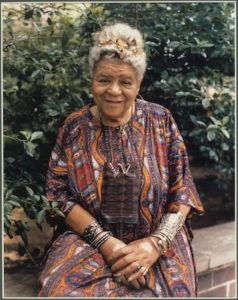
Queen Mother
On this date in 1898, Queen Mother, a Black activist and American Civil Rights leader, was born.
Queen Mother Moore was born Audley Moore in New Iberia, Louisiana. Her early experiences with racial violence in the South profoundly affected her consciousness at a young age. Her parents died when she was in fourth grade, and by age 14, Moore became the primary supporter of her two younger sisters, Eloise and Lorita.
During the 1918 influenza epidemic, she worked as a volunteer nurse. During World War I, she and her two sisters traveled to Anniston, Alabama, to help create what she called "the first USO for Black soldiers," which provided medical care, food, and other services for soldiers who were denied assistance by the Red Cross.
Soon, she returned to New Orleans, where she heard Marcus Garvey speak. This experience of collective unity deeply affected Queen Mother and resulted in her joining the Universal Negro Improvement Association (UNIA).
Queen Mother relocated with her husband and two sisters to Harlem in the early 1920s. There, she organized domestic workers in the Bronx labor market and helped Black tenants struggle against white landlords. She was arrested repeatedly for her activities, which would not stop her activism. In 1931, she participated in the Communist Party's march in Harlem to free the Scottsboro Boys. Inspired by the party's stance on anti-racism, Queen Mother joined the International Labor Defense and the Communist Party. During the 1930s, she organized around housing issues, the Italo-Ethiopian War, racial prejudice in film, and many other issues confronting poor and oppressed Black communities.
She was a Communist Party candidate for the New York State Assembly in 1938 and for Alderman in 1940. She was also a member of the National Association of Colored Women and the National Council of Negro Women. By 1950, Queen Mother had resigned from the Communist Party and helped found the Universal Association of Ethiopian Women, which worked on welfare rights, prisoners' rights, and anti-lynching. In 1963, she formed the Reparations Committee of Descendants of American Slaves to demand government reparations for Blacks. She created support around the country to get over a million signatures to petition the government and successfully presented the signatures to President Kennedy in December of that year, the 100th anniversary of the signing of the Emancipation Proclamation.
In the late 1960s, Queen Mother was one of the first signers of the Republic of New Africa's Independence Charter, which called for the creation of five independently governed states. In the early 1970s, Queen Mother began to travel throughout Africa at the invitation of political leaders of newly independent African nations. She visited New Guinea, Ghana, Tanzania, Uganda, and Nigeria. Also, in that same period, she was officially installed as "Queen Mother" in an Ashanti ceremony in Ghana. In the late 1970s, she helped to found the Eloise Moore College of African Studies, Vocational, and Industrial School in Parksville, New York, in memory of her sister, who had died in 1978.
Declining health and advancing age slowed Moore’s long career of activism. She remained a constant presence in New York political circles and was known and loved by activists nationwide. She was present when Nelson Mandela came to New York in the summer of 1990 and was one of only five invited female speakers to address the Million-Man March in 1995. The black liberation struggle lost a formidable warrior when Queen Mother Moore died on May 2, 1997.
Black Women in America: An Historical Encyclopedia
Volumes 1 and 2, edited by Darlene Clark Hine
Copyright 1993, Carlson Publishing Inc., Brooklyn, New York
ISBN 0-926019-61-9